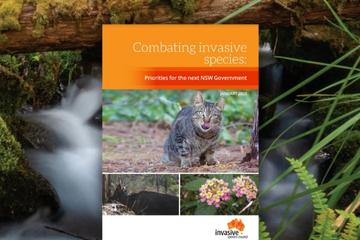An audit report looking at NSW biosecurity responses and compliance released this week reveals that NSW Department of Primary Industries (DPI) has been found wanting.
“NSW DPI needs to lift its game in how the department leads the state’s biosecurity system,” said Invasive Species Council CEO, Andrew Cox.
The NSW Audit Office review assessed the effectiveness and cost of DPI’s biosecurity emergency response and prevention work. DPI’s compliance program is a key prevention activity.
The NSW Auditor-General made six key findings and six recommendations.
“While NSW runs a relatively good biosecurity system by Australian standards, its systems have serious gaps.
“Improvements are needs in the areas of data collection and analysis, environmental and community biosecurity, formal partnerships, risk management and emergency response reviews.
“When it comes to national responses, there are clear systems in place. This is not so for state initiated responses. The decision to mount a response is ad-hoc and opaque and roles are not formally defined.
“A biosecurity response is important to get right since it may be the only chance to stop a new pest or disease establishing in the state. NSW successfully eradicated red fire ants from Port Botany in 2014, potentially avoiding billions of dollars in costs.
“Compliance is a critical tool to ensure that everybody plays their part in stopping the spread of weeds, pests and diseases.”
The review recommended that formal arrangements be put in place for biosecurity responses and compliance. This was reinforced by a 2017 national biosecurity review that called for all state governments to institute formal arrangements between agriculture and environment agencies (IGAB review, rec 7).
“As a priority, formal arrangements are needed between NSW DPI and the environmental arms of government including the former OEH, EPA and NPWS.
“The audit report highlighted problems with the agricultural focus of DPI by finding that the environment is not fully integrated into the biosecurity system.
“The review found that DPI does not have compliance policies that address the environment and does not directly address emerging risks to the environment and community amenity.
“An important finding was that NSW DPI does not consistently analyse its data and apply lessons from emergency responses. The system would also benefit from greater transparency.
“The review called for increased use of cost-benefit studies before mounting a response. DPI’s policy in this area needs to be reviewed. For many responses, like yellow crazy ants, the case for action is clear. There is no need for a cost-benefit study before proceeding.
“However, there are many other new arrivals where there is no action, and as the audit finds, DPI does not analyse the impact of these decisions.
“We welcome the review recommendation that DPI “publish annual data on performance targets and outcomes for its biosecurity compliance and emergency response activities.”
“Oversight of the state’s biosecurity system could also be improved by re-establishing the NSW biosecurity advisory committee, which was disbanded in 2018.
“We are pleased that NSW DPI accepted the auditor’s recommendations and is committed to improving its risk assessment procedures,” said Mr Cox.









